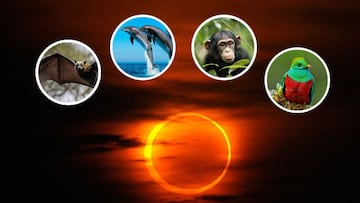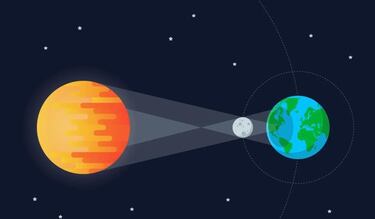Total solar eclipse 2024: how does it affect the behavior of animals?
Humans may get rather excited about the rare celestial occurrence, but have you ever considered how eclipses affect our feathered and four-legged friends?

The total solar eclipse will be visible across the US and beyond this weekend – here’s what you need to know about that – and for many animal lovers it is important to know how our friends from the other kingdom can react, as well as the effects that it can have on the behavior of birds, dolphins, chimpanzees, among others. We share with you the keys things to be aware of.
How do non-domestic animals react during solar eclipses?
Douglas Duncan, director of the Fiske Planetarium at the University of Colorado, expressed in an interview with TIME magazine his various experiences regarding animal behavior during solar eclipses that have occurred in recent years, recounting that:
- Total solar eclipse of February 1998: in the Galapagos Islands, a group of dolphins and whales exhibited strange behavior for five minutes as the sun darkened; they leaped out of the water in total silence.
- Total solar eclipse of November 1994: a group of llamas in a rural region of Bolivia were observed gazing at the sky during the astronomical phenomenon.
A study published in the American Academy of Arts and Sciences in 1935 highlighted that during a total eclipse in August 1932 in the United States, a group of bees were observed flying faster to return to their hives as quickly as possible.

How do solar eclipses affect the behavior of animals?
Specialists, astronomers, and some voices within the scientific community have pointed out that there hasn’t been ample time to fully study the effects of solar eclipses or astronomical phenomena on animals. This is due to the infrequency of it, with some events occurring only once in decades. However, so far, certain observations have been made:
Observed animal eclipse behaviors:
- Birds and similar species go to rest during the solar eclipse due to the dimming that is recorded.
- Dogs and cats often bark or are restless.
- Nocturnal animals such as bats, owls or wolves usually leave their caves or habitats to continue their way of life.
- Some fish tend to stop swimming and stay still or other marine species jump without making noise.
- Species that are livestock, such as sheep and cows, usually do not have precise effects during eclipses, they simply believe that it has fallen and it is time to end the day.
- Sometimes zoo chimpanzees during the event tend to climb to the top of their cages to see the phenomenon, however, it has been pointed out that not all captive animals found in these types of areas usually react.
- It has been observed that some species of bats are beginning to emerge from their caves.
How can animals be protected during a solar eclipse?
The National Center for Biotechnology Information in the United States reported, as we have already listed, that during a solar eclipse, animals exhibit unusual behaviors. Some instinctively return to their nests and hives, while nocturnal animals begin to emerge from their caves.

Related stories
Mike Reynolds, an American astronomy professor, told People magazine that during solar eclipses, it is recommended to bring household pets indoors to prevent them from looking directly at the sun or becoming frightened by the effects of such astronomical events.
The professor emphasized that just like humans, pets should not stare at the light of eclipses as it can cause blindness by burning the retina, with no possibility of repair. He also advised against using professional solar glasses on pets as it could adversely affect their vision.
Complete your personal details to comment